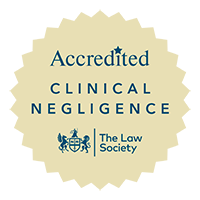Top ranked cerebral palsy claims lawyers
Meconium can be both a sign and a cause of oxygen deprivation. In the absence of careful management during labour and delivery and immediately after birth, it can lead to brain injury, cerebral palsy and permanent disability.
 What is meconium?
What is meconium?
Meconium is the name that is given to a newborn baby’s first faeces. Unlike the usual yellowish stools that the baby passes after feeding on colostrum and milk, meconium is thick, dark green, sticky and tar-like as it contains the material that the fetus ingested during its time in the womb.
What does it mean if my baby passes meconium during labour and delivery?
It is normal for a baby to pass meconium in the first few hours after birth. It is also quite common for the amniotic fluid which drains after the mother’s waters have broken to be stained with meconium.
During labour and delivery, meconium in the amniotic fluid can be a sign that the fetus (unborn baby) is suffering from stress. A fetus that is struggling with hypoxia (lack of oxygen) will have increased intestinal activity which relaxes the anal sphincter (the muscular valve which controls the release of faecal matter) and meconium is passed into the amniotic fluid that surrounds it. If the baby inhales meconium into its lungs, for example, by gasping because it is not getting enough oxygen, the sticky or lumpy meconium can block the baby’s airways.
Is meconium a sign of brain injury or a cause of brain injury?
It’s both. Passing meconium is normal but it can also be one of the signs of fetal distress in labour. If meconium is inhaled or ‘aspirated’ and is not cleared from the baby’s airway and lungs as soon as the baby is born and needs to breathe in air, it can block the baby’s airway, leading to oxygen deprivation, brain injury and, ultimately, death.
How should the presence of meconium in labour affect the mother’s maternity care?
If significant (dark green or black, thick or lumpy) meconium drains vaginally when the mother’s membranes are ruptured, this should signal the potential for fetal distress and should result in very careful management of the labour and delivery.
The baby’s heart-rate and maternal contractions should be continuously monitored by CTG (cardiotocograph) and if there are any other worrying signs or abnormalities, an obstetrician should be asked to review the labour and consider whether the baby needs to be delivered quickly by an instrumental delivery or by caesarean section.
The midwives should warn the neonatal unit paediatricians that a baby with potential meconium aspiration is about to be born so that they attend the delivery and are ready, properly equipped and waiting to take immediate steps to clear the baby’s airways and lungs, and resuscitate or ventilate the baby if necessary.
Delays in delivery of a baby who is suffering from distress, and delays in clearing the baby’s airway and providing resuscitation immediately after birth can both extend the period of oxygen deprivation leading to severe brain damage and permanent disability or death. In cases of acute hypoxia (a short but profound period of oxygen deprivation) it takes only a matter of minutes for the baby’s brain to be damaged. Delays in clearing the baby’s airway and resuscitation after birth can be enough to turn a potentially reversible episode of hypoxia into irreversible brain damage with permanent, severe disability.
What signs can a baby with severe respiratory distress from meconium aspiration display?
Short term signs of respiratory distress from meconium aspiration include:
- Rapid breathing.
- Retraction or distention of the chest
- Grunting
- Cyanosis (blue colouring of the skin from lack of oxygen saturation)
Permanent damage from severe meconium aspiration includes:
- Cerebral palsy
- Developmental disability
- Physical disability
- Learning difficulties
If you are caring for a child with brain injury or disability caused by medical negligence, contact us by email at cerebralpalsy@boyesturner.com.
They have a great deal of knowledge and expertise, and client care seems to be their top priority.
Chambers Guide to the Legal Profession
Contact our expert Cerebral Palsy solicitors today for support with your claim




